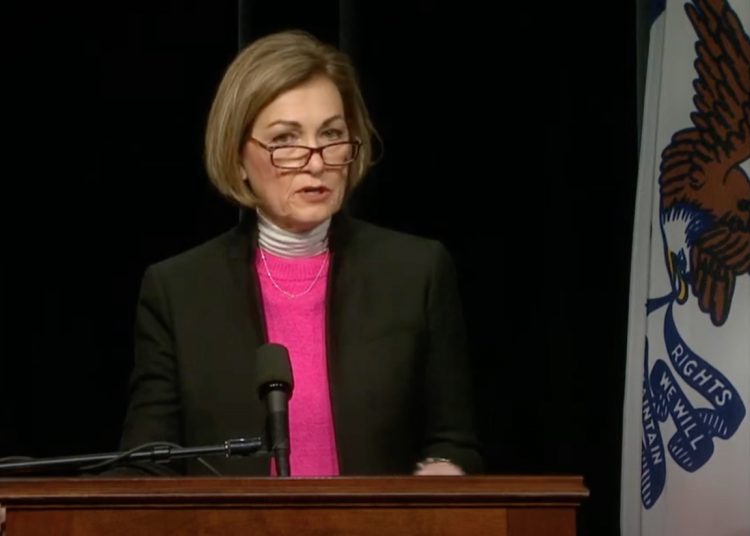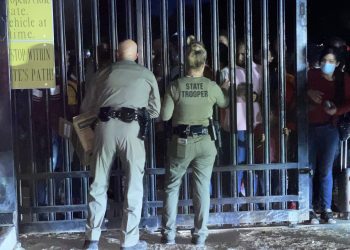DES MOINES, Iowa – Gov. Kim Reynolds, during her press conference at Iowa PBS studios, said that when the COVID-19 vaccines receive final approval, and the federal government distributes them to the states, Iowa will be ready.
“Whenever the decisions regarding approval are made, and distribution begins, Iowa is ready. The Department of Public Health has developed a vaccination strategy in coordination with a wide range of public and private sector partners, including public health emergency management agencies, healthcare organizations, industry groups that include critical infrastructure sector sectors, policymakers, and community vaccination providers,” she said.
Reynolds said the strategy addresses allocation, distribution, transportation, dispensing, and administration of the COVID-19 vaccines and is based on the availability of the vaccine and distribution occurring through existing structures.
On Monday, the Trump administration said they anticipate distributing 22.5 million doses of the Pfizer vaccine to the states and 15 million doses of the Moderna vaccine. AstraZeneca is also close to having FDA approval for its vaccine. Vaccination distribution is anticipated to be just weeks away.
“At first, there will be a limited supply of the COVID-19 vaccine. So our immediate vaccination efforts will focus on those critical to the response, including those who provide direct care and maintain critical infrastructure and those that have the highest risk for developing serious illness from the virus,” Reynolds said.
“Prioritization of populations while the vaccine supply is limited is being considered by the Advisory Council on Immunization Practices and the National Academy of Medicine. In addition to their recommendations, the Iowa Department of Public Health and Dr. (Caitlin) Pedati (the state epidemiologist) will also consider CDC guidelines and work with various stakeholders to implement a targeted approach for COVID-19 vaccination,” she added.
Reynolds urged Iowans to be patient.
“As we move towards Thanksgiving, the impending vaccine brings with it the hope that life will return to normal soon; however, it will take some time for the vaccine to become widely available. And in the meantime, we must be patient and continue to do everything that we can to prevent getting and spreading the virus,” she said.
The Iowa Department of Public Health announced 1800 additional positive cases of COVID-19 out of 8,101 tested. Since the pandemic began, over 216,000 Iowans have tested positive for COVID-19.
There have been 2,225 Iowans who died after testing positive for COVID-19, 76 percent of those deaths being of Iowans age 60 or older. There are currently 1,351 Iowans hospitalized with COVID-19, including 275 in ICU and 155 on ventilators. The rolling 14-day hospitalization total is over 18,800 people and is still trending upwards.
Reynolds later defended her mitigation efforts when asked if she acted soon enough when numbers started to climb again in October.
“So we’ve been, I think, very aggressive and how we’ve handled it, it’s easy to look back and see if you maybe should have done more done less or handled a little a little bit differently. I’ve tried to be very targeted in the mitigation efforts that we put in place,” she said.
Reynolds said that she had to work to find a balance between preserving the lives and livelihoods of Iowans in leading the state’s response to COVID-19. With her latest order, she said the increasing hospitalization rates was the metric that caused her to “dial things back up” with mitigation efforts.
She noted that states that have not opened back up are seeing their cases increase as well.
“It’s not just Iowa,” Reynolds said. “I think we lose sight of that sometimes, you want to focus on what’s going on in Iowa, but we’re actually seeing this across the country. And we’re seeing states that have had significant mitigation efforts in place the entire time, the entire time, haven’t even opened up or given any business or anything any sense of relief. And if you think people don’t have fatigue, you know, that’s another problem,” Reynolds said.
She pointed out protests happening in California because they never relaxed their mitigation efforts.
“So you have to be careful about over mitigating to people and having them still feel like they’re a part of the service part of the answer, the solution, and we’re not over asking,” Reynolds said.
Listen to the full press conference below:
















